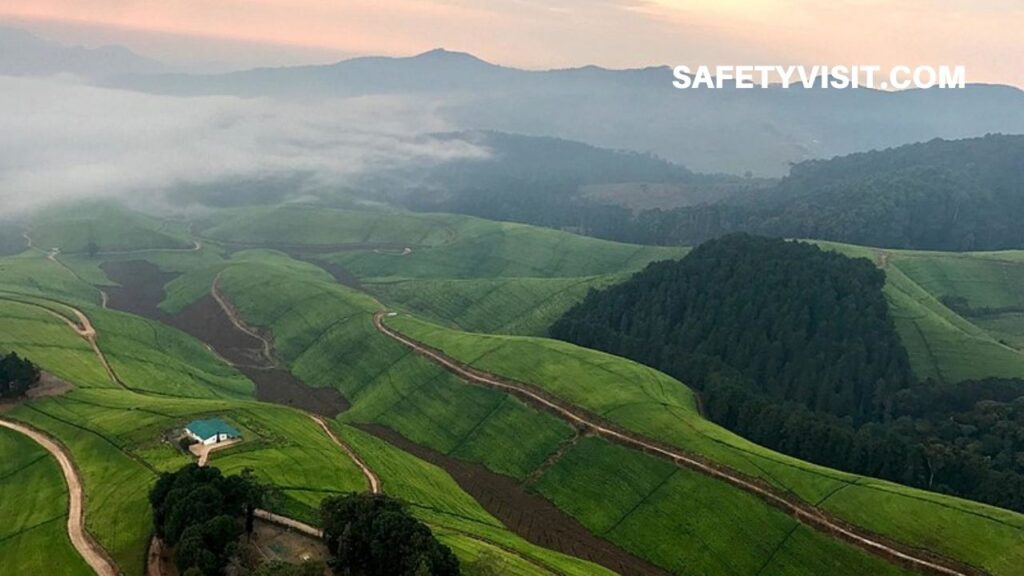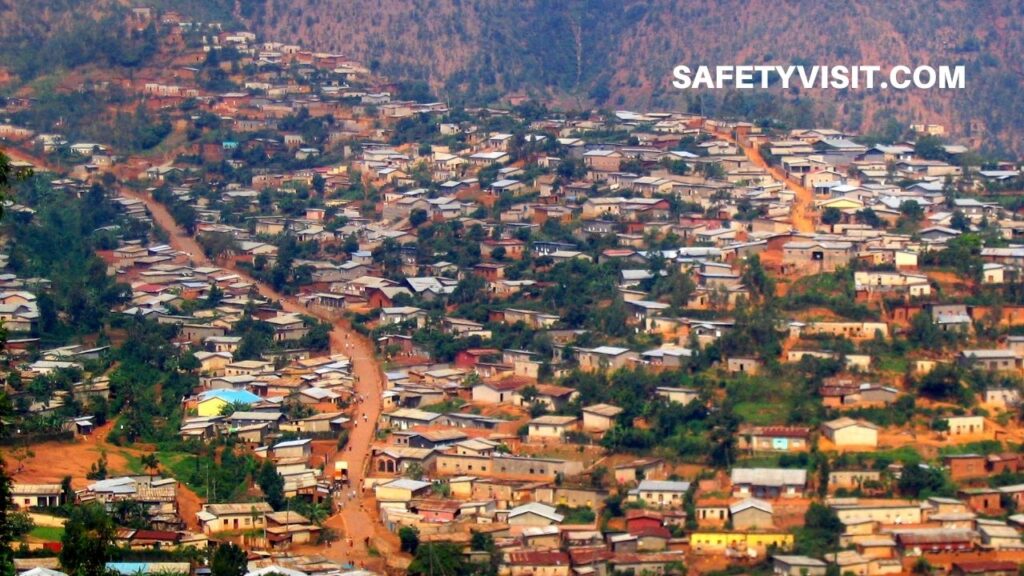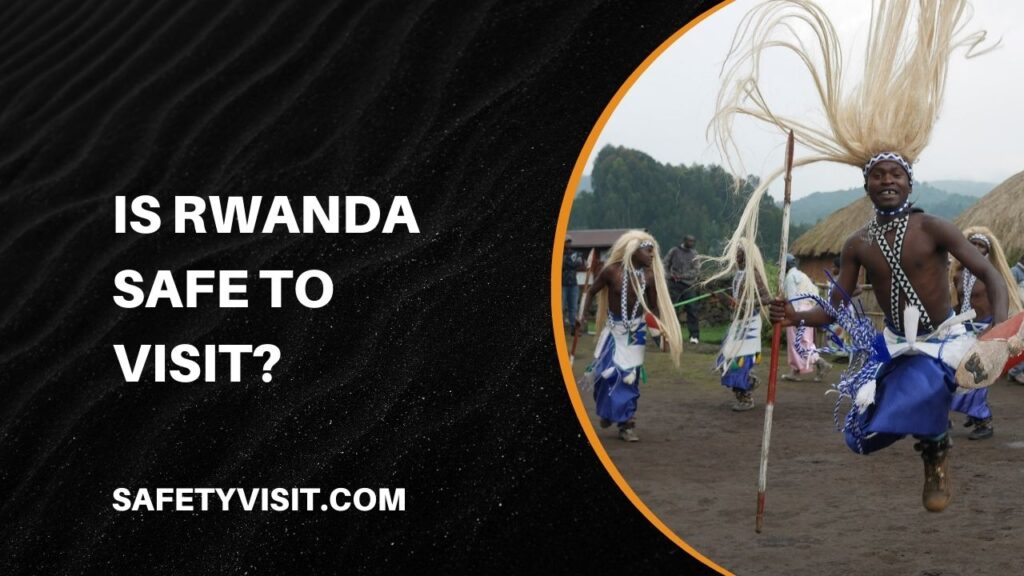Is Rwanda Safe To Visit? Rwanda is generally considered safe for tourists, with low crime rates and a stable political environment.
One of Africa’s most alluring travel destinations is Rwanda, sometimes known as the “Land of a Thousand Hills.”
Rwanda is well-known for its stunning scenery, abundant wildlife, and dynamic culture. It provides tourists with an unforgettable experience.
Though the nation’s image has changed over time from one tarnished by the 1994 genocide to one that is a symbol of safety, progress, and resiliency, travelers’ top concern—as with any destination—remains safety.
This article examines the safety of visiting Rwanda, important things to think about before you go, possible safety issues, and must-have advice for a hassle-free trip.
Contents
What Makes Rwanda Well-Known?
Natural Beauty and Wildlife
Rwanda is globally recognized for its stunning natural beauty and diverse wildlife. [Is Rwanda Safe To Visit?]
Geographically, the nation is diverse, with misty slopes of Volcanoes National Park, savannahs of Akagera National Park, and dense rainforests of Nyungwe Forest National Park.
One of the most well-known attractions in Rwanda is gorilla trekking, which is one of the many unique experiences these parks have to offer.
Travelers from all over the world come to Volcanoes National Park for the once-in-a-lifetime opportunity to go up close and personal with the endangered mountain gorillas in their natural habitat—a process known as gorilla trekking.
Spotting the Big Five in Akagera National Park and birdwatching in the diverse ecosystems of Nyungwe Forest are two additional wildlife experiences.
In addition to gorillas, other unique animals found in Rwanda include golden monkeys, chimpanzees, and various bird species.
These experiences are guaranteed to be both distinctive and responsible due to the nation’s dedication to conservation and sustainable tourism.
In order to safeguard visitors and wildlife alike, the Rwanda Development Board has put strict rules and procedures in place, guaranteeing that relationships with the natural world are sustainable and safe.
Cultural and Historical Attractions
Rwanda has a rich cultural and historical legacy in addition to its natural charm. [Is Rwanda Safe To Visit?]
The Kigali Genocide Memorial provides educational insights into the 1994 genocide, which claimed over 800,000 lives, and acts as a somber reminder of the nation’s past.
The memorial offers visitors a profound understanding of Rwanda’s tragic past and its incredible recovery. It is a place of reflection, learning, and hope.
For those who want to comprehend the intricacies of Rwanda’s transition from destruction to peace, this is an essential site to visit. [Is Rwanda Safe To Visit?]
Local marketplaces, like Kigali’s Kimironko Market, offer a colorful array of goods ranging from vibrant textiles and traditional Rwandan art to fresh produce and locally crafted handicrafts. These markets offer a window into the everyday lives and customs of Rwandans.
In addition, tourists can explore cultural villages like Iby’Iwacu Cultural Village, where they can discover traditional dance, music, food, and customs from Rwanda.
Rwanda has achieved great progress in education and cultural preservation, crafting a fair account of its past and present.

Is Rwanda Safe to Visit?
General Safety Overview
Rwanda is regarded as one of the safest travel destinations in Africa, with low crime rates, particularly in tourist areas, and a reputation for tidy, well-organized cities and friendly locals.
It is common for visitors to walk around Kigali at night without serious safety concerns, though common sense precautions like avoiding dimly lit areas and being aware of one’s surroundings are always advised.
Kigali, the capital city, is frequently praised for its safety, modern infrastructure, and hospitality.
The government of Rwanda has implemented a number of measures aimed at guaranteeing security and safety throughout the nation.
Crime rates are relatively low, with violent crimes being rare, and this is reflected in the conspicuous presence of police officers and security personnel in public places, especially in tourist hotspots.
But just like anywhere else, Rwanda is not immune to small-time theft and scams, especially in populated areas. [Is Rwanda Safe To Visit?]
Political Stability
President Paul Kagame has brought about political stability in Rwanda, which has greatly enhanced the reputation of safety in the nation.
The government has prioritized peacekeeping, economic growth, and reconciliation since the genocide ended in 1994. This has resulted in a stable atmosphere for both locals and tourists.
Rapid economic growth, development initiatives, and international relations all demonstrate the nation’s progress. [Is Rwanda Safe To Visit?]
Travelers must, however, keep up with local news and advisories because political situations can change quickly in any nation.
Even though Rwanda has been stable for a long time, it is wise for any traveler to be aware of the current state of affairs.
Health and Sanitation
Travelers should give careful thought to health and sanitation in Rwanda. Although the country’s healthcare system has improved significantly, visitors are advised to take preventative measures against diseases like malaria.
Certain areas are prone to malaria, so it is advisable to use insect repellents and antimalarial drugs, especially when visiting rural areas. Vaccinations against rabies, typhoid, hepatitis, and yellow fever are also advised.
Carry enough repellent for mosquitoes, use bed nets when available, and limit your water intake to bottled or treated water.
Travelers should be cautious when consuming street food and make sure that any food they eat is thoroughly cooked.
Bottled water is widely available and is the safest option for drinking. Rwanda has strict hygiene regulations, particularly regarding food and water safety.
If you have any dietary requirements or preferences, let your guide or lodging know ahead of time.
Road Safety
Another thing to think about when traveling to Rwanda is road safety. Although major roads in major cities like Kigali are usually kept up, rural roads can be difficult to navigate because of potholes, sharp curves, and uneven surfaces.
It is common to see motorbikes, cyclists, and pedestrians sharing the road, and driving standards can vary. For those who are not familiar with the driving conditions in the area, hiring a driver or using reputable taxi services is advised.
In order to reduce accidents, seat belt use is also required, and traffic laws are rigorously enforced. [Is Rwanda Safe To Visit?]
It is important for visitors to be aware that Kigali traffic can get backed up during rush hour. While using “moto-taxis,” or motorbike taxis, is common and reasonably priced, it is best to stick to using those that are registered and provide helmets for safety.
As an alternative, employing ride-hailing services like SafeMotos or Yego Moto provides increased security.

Safety Concerns to Consider in Rwanda
Border Areas
While Rwanda is a relatively safe country, border areas—especially those near the Democratic Republic of the Congo (DRC)—should be avoided due to the region’s history of instability, conflict, and sporadic armed clashes.
It is also important to be aware of the borders with Burundi and Uganda, as political unrest occasionally compromises security there. [Is Rwanda Safe To Visit?]
It is advised that visitors stay away from these regions unless absolutely necessary and keep up to date on current events by following official government travel advisories and trustworthy news sources.
Petty Crimes
Like in any destination, crowded areas like marketplaces, bus terminals, and well-known tourist destinations can be the scene of small-time crimes like pickpocketing, bag snatching, and scams.
It is wise to use hotel safes whenever feasible, watch over personal belongings, and refrain from wearing valuables in public.
Avoid using ATMs on the street and instead use those inside banks or other secure locations.
In order to prevent receiving counterfeit money, it is also advisable to exchange money at reputable banks or exchange bureaus.
Natural Hazards
Natural hazards can arise due to Rwanda’s terrain and weather, especially during the rainy seasons, which span from March to May and October to December.
Landslides and flooding can occur during these times in hilly areas, particularly in rural areas. [Is It Safe To Visit Rwanda?]
It is important for travelers to plan their trips appropriately, monitor weather forecasts, and be ready for unforeseen weather conditions, especially when participating in outdoor activities like hiking or gorilla trekking.
Safety Tips for Travelers Visiting Rwanda
General Safety Tips
- Stay in reputable accommodations that have good reviews and are recommended by reliable sources.
- Use trusted tour operators for activities like gorilla trekking, safaris, and guided city tours. [Is Rwanda Safe To Visit?]
- Avoid walking alone at night in unfamiliar areas, even in generally safe cities like Kigali. Opt for taxis or ride-hailing services when moving around after dark.
- Be cautious when engaging with strangers offering unsolicited assistance or services. Always confirm their legitimacy before proceeding.
Health and Well-being
- Get the necessary vaccinations well in advance before traveling to Rwanda. Consult with a healthcare provider about the required and recommended vaccines.
- Take preventive measures against malaria, such as taking antimalarial medication, using insect repellent, and sleeping under mosquito nets.
- Ensure you have comprehensive travel insurance that covers medical emergencies, evacuation, and theft. Familiarize yourself with the terms and conditions of the policy and keep emergency contact numbers handy.
Emergency Contacts and Local Laws
- Familiarize yourself with emergency numbers, such as 112 for police and 912 for medical emergencies. [Is Rwanda Safe To Visit?]
- Respect local laws and customs. Rwanda is a conservative country in terms of dress and behavior, particularly in rural areas. Travelers should dress modestly and respect local norms, especially when visiting places of worship or cultural significance.
- Be aware of Rwanda’s strict ban on plastic bags. Travelers are encouraged to use reusable bags and containers. Bringing plastic bags into the country could result in fines, so it’s best to leave them at home.
What to Do in Case of an Emergency in Rwanda?
Emergency Contacts and Procedures
Having easy access to important contacts is crucial in an emergency. [Is Rwanda Safe To Visit?]
The police in Rwanda are highly efficient, and you can contact them by calling 112 in case of emergency. If you have a medical emergency, you should call 912.
Additionally, it is a good idea to have the contact details of your nation’s embassy or consulate in Kigali on hand, as they can offer assistance and direction in an emergency.
Medical Emergencies
In case of an emergency, Kigali has a number of well-regarded medical facilities, including King Faisal Hospital and the University Teaching Hospital of Kigali, which provide excellent medical care and have an English-speaking staff.
It is a good idea to carry a basic first-aid kit and know the location of the closest medical facility to your accommodation, as medical facilities can be scarce in remote areas.
Last Word
Travelers can enjoy a distinctive blend of scenic beauty, fauna, and cultural immersion in Rwanda, which is a generally safe destination. [Is Rwanda Safe To Visit?]
If tourists are alert and take the appropriate safety measures, they can enjoy a safe trip in these well-organized urban centers with low crime rates and stable political environments.
While there are some safety concerns, like minor crimes in crowded areas and political unrest close to some borders, these can be avoided with enough planning.
Your trip to Rwanda will be easy and unforgettable if you are prepared and aware of potential risks, especially in border areas.
See Also: Is Uganda Safe To Visit? Travel Warning 2024!
FAQs
Is it safe to travel to Rwanda for solo travelers?
Yes, Rwanda is regarded as a safe place for single travelers; however, you should still exercise common sense and avoid isolated areas at night and notify someone of your whereabouts.
Do you need to be vaccinated before visiting Rwanda?
It is advised to have vaccinations against yellow fever, typhoid, hepatitis, rabies, and other diseases prior to visiting Rwanda. For specific recommendations, speak with your healthcare provider. [Is Rwanda Safe To Visit?]
What are the common scams tourists should be aware of in Rwanda?
Using reputable service providers can help avoid issues like pickpocketing in crowded areas, potential scams involving unofficial tour guides, and inflated prices at some local markets.
How dependable is Rwanda’s public transit system?
While there are a number of dependable public transportation options available in Rwanda, such as buses, moto-taxis, and car rentals, it is advisable to use a private driver or a reputable taxi service for added security and comfort.
Is Rwanda safe for families to visit? Can I go there with kids?
Rwanda is safe for families; in fact, a lot of lodgings and tour companies cater especially to families with kids, and family-friendly gorilla trekking activities have rules.
Conclusion: Is Rwanda Safe To Visit?
For those who want to learn more about Africa’s history, culture, and wildlife, Rwanda is a fantastic place to visit. [Is Rwanda Safe To Visit?]
Travelers of all stripes, from families to lone adventurers, will find the nation to be a great option due to its dedication to safety, sustainability, and hospitality.
Although travel is generally safe, you will have a better trip experience in this stunning nation if you are aware, organized, and cautious.
A trip to Rwanda can be extremely safe and rewarding if the proper planning and knowledge are put in place.

